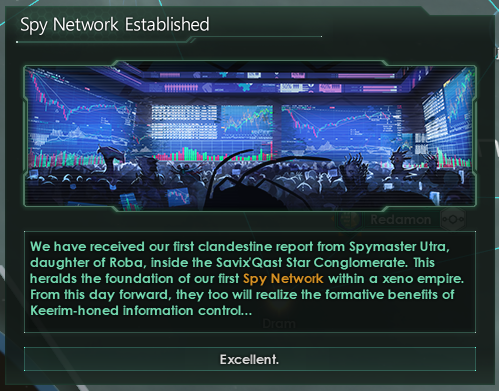Stellaris Dev Diary #197: Operations and Assets
Today we’re going deeper into some of the things you can do with the Spy Networks your envoys carefully built up last week.
As noted there, building up a Spy Network will passively provide Intel on the empire they are in as their Infiltration Level increases. (This was previously called “Spy Network Level” but has been renamed for clarity.) Once they've built up enough strength, you can choose to run Operations within the empire. A strong Spy Network can have sufficient bandwidth to run multiple Operations simultaneously.
Like First Contact, Operations use a variant of the Archaeology system first introduced in Ancient Relics. Unlike Archaeology and First Contact, however, when Operations complete objectives necessary to complete their mission, they usually do not require your intervention unless something important has come up.
When starting an Operation, you have the option of assigning a single Asset to the mission.
Operations have an energy credit cost to initiate as well as energy upkeep while ongoing. Most Operations pause for your final approval before they initiate their final step, but your operatives can be given permission to launch as soon as it is ready in the UI.
Covert missions are a little tricky, and sometimes things are a little unpredictable. If problems arise during the mission, your spymaster may contact you seeking guidance. Do you provide them with additional resources to bribe the problem away, have them dedicate a larger portion of the Spy Network to the mission (assuming they have any unallocated Infiltration available), or do you scrap the mission and leave the Asset assigned to the mission out to dry? Likewise, even when things go according to plan, sometimes your operatives have to take what they can get - while other times they may stumble upon far more than they expected.

Yes, you can run operations within a hive.
Completing Operations often has an impact on your Infiltration Level - some resources get compromised or otherwise unusable, and depending on the Operation you performed, a hornet’s nest of security may have been stirred. If you had an Asset assigned to the Operation, you will often be given a chance to use them as a scapegoat, burning them to protect the rest of the Network.
[h3]Operation Types[/h3]
We’ve split Operations into four different categories, and here’s a more detailed summary of each type and a few of the Operations we’re planning. (As always with in-development sneak peeks, these are subject to change.)
Subterfuge Operations are common Operations that work to improve the state of the network or do good old fashioned spying on the target empire. Gather Information, Acquire Asset, and Steal Technology are examples of planned Subterfuge Operations.
Sabotage Operations are dedicated to destruction of tangible or intangible things. Sabotage Starbase and Diplomatic Incident are examples of planned Sabotage Operations.
Manipulation Operations twist the truth and replace it with better truths that serve your empire’s needs. Smear Campaign and Extort Favors are examples of planned Manipulation Operations.
Provocations are the most extreme Operations that are almost guaranteed to have blowback. These tend to be relatively difficult to pull off but have major results. Arm Privateers is an example of a Provocation.
[h3]
Examples of Operations[/h3]
Gather Information (Subterfuge) is one of the simplest Operations, requiring an Infiltration of 20 or higher to initiate. Your spymaster will send their operatives out to, well, covertly gather information. After a relatively short period of time the spymaster will deliver a dossier containing the intelligence to you, which might grant a bonus to current Intel level or provide an Intel Report granting increased Intel on a category for a time period.
It’s not the most glamorous of missions, but should rarely backfire in a spectacular manner. Since Intel decays slowly (currently set to 1 point per year), the Gather Information Operation provides a fairly consistent way to learn more about the galaxy.
Assigning an Asset to the mission will skew the results towards the Asset’s interests, significantly increasing the chance of getting an Intel Report targeting the empire’s Government, Diplomacy, Military, Economy, or Technology.

Many Jeferians died to bring us this work-in-progress screenshot.


Operations do not always produce the same results.
Steal Technology (Subterfuge, Technology) is another one that has created a stir on the forums. Through a variety of means, your agents will attempt to gain access to the research databases of the target. Depending on how things go, several outcomes could occur - they might be able to get some hints as to how a technology works (granting it as a research option and providing some progress), they may be able to leave a backdoor (increasing your empire’s research speed for a time), or if things get messy, they could just destroy whatever research they can (inflicting penalties on the target). Your operatives can only take research that your empire has the hope of understanding, so you must meet all appropriate prerequisites.
This leads to an interesting situation where you ideally want to be spying on an empire of greater technological prowess than your own, but that in itself is riskier since they may have a better chance of catching your operatives.

These blueprints are like an Escher drawing.
The Enigmatic Engineering Ascension Perk will block these attempts, as it makes your technology impossible for other empires to reverse-engineer. The spying empire will not know this, however, until they try.

The Sensor Range effect has been replaced as well.
Smear Campaign (Manipulation, Diplomacy) is dedicated to working against the relationship two empires may have. After the first chapter completes, you'll have the choice of which relationship you wish your operatives to attempt to diminish. Later, your agents will inform you of the tactics they want to use, with different schemes proposed based on the nature of the selected empires.
In this example, I'm trying to create rifts within a nearby federation by running Smear Campaigns.

And finally my agents have informed me that they're ready to unleash misinformation upon an unsuspecting foe.


Meanwhile, over in the Ztrakpor Confederated Domains...

Since their Counter-Espionage measures did not detect our shenanigans, it seems that our agents chose to kick things up a notch and add sabotage of research facilities to the false charges. They've caught wind of our false-flag operation as if they had actually uncovered an operation being being performed by their so-called ally!
The galaxy shall hear of this!
[h3]Assets[/h3]
Assets have been mentioned a few times now, and the Acquire Asset (Subterfuge, Government) is the most consistent way to gain them. It’s possible to gain Assets through random events during other Operations, but tempting them into your service is much more reliable.
Each Asset has two categories they excel at - one of each from Subterfuge, Sabotage, or Manipulation, and Government, Diplomacy, Military, Economy, or Technology. When an Operation is initiated, you can assign the Asset to be part of it, and for each category that matches, the Asset will make completing the mission easier.
Assets in regular empires are generally everyday people - a disgruntled bureaucrat, an ambitious criminal underling, or a sympathetic pop icon. In gestalt empires, they may be deviant drones that your operatives have found a way to utilize to their advantage, or they might be objects that they have taken control of - a damaged pheromone emitter, a deviant labor drone, a hacked coordination system, or a virus introduced into an engagement protocol.

Blorg. James Blorg.
Hask'Endek here specializes in Subterfuge and Government related activities, making them especially effective when assigned to the Acquire Asset mission. It turns out that having a bureaucrat able to sift through government records to find other potential marks is incredibly helpful!
If complications arise, having an expendable lackey around to take the fall for your operatives can also be attractive. While you may lure them into service with promises of support and glory, they’re really just pawns in your greater galactic schemes. Often, their true fate is to be "cleaned up" as a loose end to preserve the Spy Network's Infiltration Level after an Operation completes.
That's it for this week. Next week I plan on going over some of the other, nastier Operations. redacted.png
See you then!


 Build Spy Network diplomatic action
Build Spy Network diplomatic action Baby steps.
Baby steps.
 Some civics lend themselves nicely to covert activities.
Some civics lend themselves nicely to covert activities.

 Tell us your secrets.
Tell us your secrets. No, really.
No, really.
 More of the new Edicts.
More of the new Edicts. No more redactions here.
No more redactions here.
 Work in progress. Game development is fun, and sometimes during development, unintentional circumstances can occur.
Work in progress. Game development is fun, and sometimes during development, unintentional circumstances can occur. 